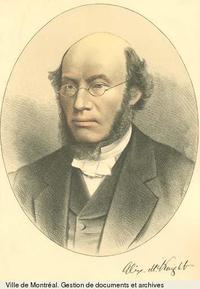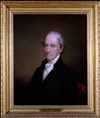
Source: Link
McKNIGHT, ALEXANDER, Presbyterian minister and educator; b. 1 Sept. 1826 in Dalmellington, Scotland, eldest child of Samuel McKnight, a farmer, and Mary Murdoch; m. 14 April 1857 Catherine Glen Kidston in Halifax County, N.S., and they had a son and a daughter; d. 27 April 1894 in Dartmouth, N.S.
Alexander McKnight attended the University of Glasgow from 1841 to 1845, winning class prizes in logic, mathematics, and natural philosophy. From 1845 to 1849 he studied theology at New College, Edinburgh, which had been established in the Great Disruption of 1843 and included in its faculty such leading evangelicals and Free Church founders as Thomas Chalmers, William Cunningham, and David Welsh. McKnight was among the first honorary members of the college’s theological society. He was licensed as a probationer by the Free Church Presbytery of Ayr in 1852.
In January 1855, on the recommendation of John Duncan, professor of Hebrew at New College, the Colonial Committee of the Free Church of Scotland appointed McKnight lecturer in Hebrew at Free Church College in Halifax. (Later he would also teach Syriac.) The college, which had offered theological courses since 1848, shared a building with Free Church Academy, and McKnight and his one colleague, Andrew King, also served as trustees of the academy. He was admitted as a probationer to the Presbytery of Halifax on 28 Feb. 1855 and two years later was ordained and inducted to St James Church, Dartmouth. After exegetics and biblical literature were added to his teaching duties in 1868, he resigned his charge at St James but remained a member of the congregation throughout his life.
Despite increasing academic responsibilities, McKnight continued to be active, at both presbytery and synod levels, in the Presbyterian Church of the Lower Provinces of British North America (which the Free Church of Nova Scotia had entered in 1860) and, after the union of 1875, in the Presbyterian Church in Canada. He participated in the theological discussions that led to the Basis of Union in 1875, and he was praised for his use of Scripture in resolving the controversy in the years before and after union over what Gilbert and Sullivan in Iolanthe would call “that annual blister, Marriage with deceased wife’s sister.” He had helped establish the Aged and Infirm Ministers’ Fund in 1869, served on church committees concerned with education, statistics, and home missions, and in 1885 was acclaimed moderator of the General Assembly.
McKnight’s election as moderator was an acknowledgement of his academic career in the previous decade. In 1871 he had been transferred to the chair of systematic theology and apologetics, and for several years he also taught church history. Attendance at the college was never high (he had had seven students in his Hebrew class in 1857), and in the early 1870s he worked with John Currie to maintain the college during a period of low attendance and threats of closure. The union of 1875 secured the future of the college, and in 1878 McKnight was appointed principal. In that year the institution, renamed Presbyterian College, opened in a new building at Pine Hill overlooking the Northwest Arm, with a somewhat improved enrolment of 19 students.
It is difficult to evaluate McKnight’s place and reputation in contemporary religious thought, since few examples of his scholarly work survive: four articles in the Theologue (the journal of Presbyterian College in Halifax) and a pamphlet entitled An outline of the historical evidence of the truth of the Christian religion (Halifax, 1876). The pamphlet, and McKnight’s teaching career, presumably earned him the honorary doctorate in divinity awarded by the University of Glasgow in 1877. Obituaries stress his erudition and his particular interest and expertise in biblical and patristic theology, Semitic languages, and Hellenistic Greek.
McKnight died before 19th-century theological developments in Europe had made their full impact on Canadian churches, but there are some indications of his response to them. He was praised for both his evangelical orthodoxy and his teaching of higher criticism. That he took a moderate position is evident in the tactful and by no means hostile discussion of evolution in An outline of historical evidence. Students at Presbyterian College, Halifax, in the 1880s read both Charles Hodge, the conservative critic of Darwin, and such liberal New Testament scholars as Fenton John Anthony Hort and Brooke Foss Westcott. During the first years of the united Presbyterian Church, McKnight played an irenic role in defending Daniel James Macdonnell of Toronto, who had publicly doubted the Westminster Confession’s statement on eternal punishment. Perhaps the most fitting comment on his life was the regret expressed in an obituary in the St. John Daily Sun in April 1894 that he had not lived to repeat that role for John Campbell* of Montreal, whose heresy trial was held the following month.
PANS, Churches, St James Presbyterian Church (Dartmouth, N.S.), reg. of baptisms, 1857–87; communion roll, 1857–87 (mfm.); MG 1, 1621, nos.10550, 11093; MG 17, 17, nos.39–47. Free Church of Nova Scotia, Ecclesiastical and Missionary Record (Halifax), 3 (1854–55): 115; 5 (1857): 19. Free Church of Scotland, Home and Foreign Record (Edinburgh), 1 (1850–51)–6 (1855–56). PCC Acts and proc., 1875–78, 1885, 1894; Synod of the Maritime Provinces, Minutes (Halifax), 1886–94. Presbyterian Church of the Lower Provinces of British North America, Minutes of the synod (Halifax), 1869, 1871. Presbyterian College, Calendar (Halifax), 1879–80, 1892–93, 1893–94; Minutes of the senate (Halifax), 1889–94. Presbyterian Record (Montreal), 1 (1876): 182; 2 (1877): 146–48; 3 (1878): 148, 189; 10 (1885): 172–73, 177; 19 (1894): 156. Theologue (Halifax), 1 (1889–90)–8 (1896–97). Atlantic Weekly (Dartmouth), 12 May 1894. Christian Messenger (Halifax), 22 April 1857. Evening Mail (Halifax), 28 April 1894. Halifax Herald, 28 April 1894. Presbyterian Witness, and Evangelical Advocate, 9 May 1875, 27 Nov. 1875–24 June 1876, 19 May–23 June 1877, 30 May–13 June 1885, 16 March 1889, 28 April–12 May 1894, 5 May 1896. St. John Daily Sun, 30 April 1894. E. A. Betts, Pine Hill Divinity Hall, 1820–1970: a history (Halifax, 1970). William Gregg, Short history of the Presbyterian Church in the Dominion of Canada from the earliest to the present time (Toronto, 1892). History, Church of St. James, Dartmouth, Nova Scotia ([Dartmouth, 1971?]). J. T. McNeill, The Presbyterian Church in Canada, 1875–1925 (Toronto, 1925).
© 1990–2024 University of Toronto/Université Laval
Image Gallery

Cite This Article
Hannah M. Lane, “McKNIGHT, ALEXANDER,” in Dictionary of Canadian Biography, vol. 12, University of Toronto/Université Laval, 2003–, accessed April 19, 2024, http://www.biographi.ca/en/bio/mcknight_alexander_12E.html.
The citation above shows the format for footnotes and endnotes according to the Chicago manual of style (16th edition). Information to be used in other citation formats:
| Permalink: | http://www.biographi.ca/en/bio/mcknight_alexander_12E.html |
| Author of Article: | Hannah M. Lane |
| Title of Article: | McKNIGHT, ALEXANDER |
| Publication Name: | Dictionary of Canadian Biography, vol. 12 |
| Publisher: | University of Toronto/Université Laval |
| Year of publication: | 1990 |
| Year of revision: | 1990 |
| Access Date: | April 19, 2024 |








